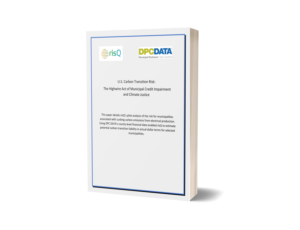Resources
DPC DATA and risQ Publish First-Ever White Paper on Carbon Transition Risk and Its Impact on Local Municipal Credits
This paper details risQ’s pilot analysis of the risk for municipalities associated with curbing carbon emissions from electricity production. Using DPC DATA’s county-level financial data enabled risQ to estimate potential carbon transition liability in actual dollar terms for selected municipalities.
ROSELAND, NJ – DPC DATA (DPCDATA.com), a leading provider of digital information solutions for the municipal bond market, and Boston-based startup risQ (risQ.io) have announced the publication of a new white paper, “U.S. Carbon Transition Risk: The Highwire Act of Municipal Credit Impairment and Climate Justice.” The paper is available for download here.
Carbon transition risk, which is the risk associated with the requirement to curb carbon emissions, has credit and social impact considerations which municipalities must increasingly navigate. Until now, however, determining risk levels with any degree of accuracy has been difficult, due in part to a lack of consistent and reliable municipal credit data as well as appropriate analytical models.
 “Adapting to climate change is crucial for the U.S. economy, yet there has been a lack of actionable data for stakeholders,” says risQ Chief Commercial Officer, Chris Hartshorn.
“Adapting to climate change is crucial for the U.S. economy, yet there has been a lack of actionable data for stakeholders,” says risQ Chief Commercial Officer, Chris Hartshorn.
In this first-ever analysis of transition risk, risQ calculated the carbon transition financial liability for electricity production (EP) sectors in counties across five states (NY, NJ, OH, MS, TX), leveraging DPC’s newly available MuniCREDIT Financials data to identify county obligors with EP sectors having high levels of exposure and vulnerability to emission reduction mandates. (The EP sector was selected for analysis because it is directly impacted by federal, state, and local actions aimed at reducing and taxing emissions.)
“This analysis integrated DPC’s county-level data, which we sourced from the financial disclosure documents of all the debt-issuing obligors in the five states,” says Triet Nguyen, DPC’s Vice President of Strategic Data Operations. “Because of our exacting standards and data capture processes, the data risQ used in this noteworthy analysis is clean and consistent and mapped to the appropriate municipal obligors. This allows risQ to estimate the potential carbon transition liability in actual dollar terms and then analyze it in the context of the local entity’s fiscal resources.”
Key Findings
The paper points out carbon-intensive municipal obligors experience revenue- and cost-line impacts, resulting in rising living and operating costs for their constituents.
“There are so many implications for carbon transition risk across the municipal bond ecosystem,” adds Colin Sullivan, risQ’s Chief Operating Officer. “Many local tax bases are intrinsically reliant on Scope 1 carbon emissions, not the least of which are those which fossil fuel-based electricity production. This is an issue for bond issuers to prepare for and disclose, for bond buyers to factor into portfolio decisions, and for ratings agencies to get in front of. More than that, at federal and state levels, the implications of carbon pricing on local communities need to be considered, and especially in communities that are already disadvantaged and with less affluent populations.
Among the key findings:
Municipal debt issuing communities’ carbon transition risk swamps their pension liabilities. Across 334 debt-issuing counties across 5 states, 92% of counties with available pension data have larger total Scope 1 emission liabilities aggregated over all greenhouse gas sectors than pension liabilities — an issue that itself has led the list of municipal market concerns for years.
Communities vulnerable to carbon transition risk also have outsized employment risk and education gaps. A socioeconomic vulnerability analysis using all US census tracts shows that communities with the highest per capita electricity emissions are those with the highest levels of risk from an employment sector perspective, have significantly lower educational attainment levels and more health risks.
Areas with some of the worst physical climate risk contribute the most emissions. Texas and Florida, two states with outsized physical climate change risk, have the highest electricity production Scope 1 CO2 liabilities, with the former totaling $13.5B on its own, or 12% of the US total.
Going forward, risQ and DPC Data plan to expand the analysis to encompass all fifty states.
About DPC DATA
DPC DATA has served the municipal bond marketplace with disclosure information and solutions since 1992. DPC was one of the original SEC-designated Nationally Recognized Municipal Securities Information Repositories (NRMSIRs) and was a pioneer in developing solutions for the municipal securities lifecycle. Today, the company is known for its continued leadership in building and delivering digital information solutions for the muni marketplace. Their municipal credit data, disclosure-related regulatory compliance, investment suitability, and portfolio surveillance solutions are used by more than 100,000 professionals at leading brokerage, clearing, and advisory firms. Visit DPCDATA.com to learn more about the company’s suite of products, including MuniPOINTS and MuniCREDIT Solutions.
About risQ
The risQ mission is to catalyze and inform systems-level adaptation to climate change. The company models the complex financial risks posed by climate change, translating them to actionable insights for municipal debt stakeholders. risQ (risQ.io) is a spinout of Northeastern University’s Sustainability and Data Sciences (SDS) Lab and is funded by the National Science Foundation.
Get the latest advances in your inbox!
Sign up and get the latest news and insights about DPC DATA’s municipal bond credit, disclosure, and compliance data solutions delivered right to your inbox.

